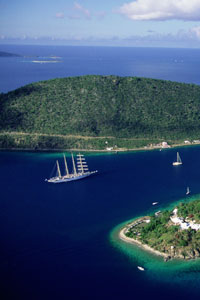When Columbus sighted them in 1493, he named them ‘Saint Ursula and her 11,000 virgins’ after the legendary sea goddess. They quickly became a sailor’s paradise; steady trade winds guided seamen to their sheltered channels, where they could relax on tropical beaches sipping rum beneath swaying palms. For some time they were considered purely strategic resources but they later developed a sugar cane economy. Those days have long since past and today it has become a tax haven under British administration, with an economy founded on tourism and financial services and a per capita GDP almost as high as Britain itself. There are 36 islands in total, many of them uninhabited, and its calm, crystal waters have become a Mecca for yachtsmen the world over and there are many other water sports to be sampled. The gorgeous, unspoilt national parks of Virgin Gorda attract a host of rich visitors, with some of the richest biodiversity in the Caribbean, not to mention stunning rock formations and the sparkling water-caves at The Baths. After hours, you can let your hair down on Jost Van Dyke and join in with the Caribbean swing. For this is the Carribean; though it remains a British territory and Tortola in particular has an international flavour, the locals are largely descended from slaves and the African influence is reflected in the music, the food and the festivals. It’s impossible not to chill out here; mind your manners, as always, but always remember to relax.
Getting there There are airports on Virgin Gorda, Tortola, and Anegada, though there are no direct flights from outside the Caribbean; European of American visitors must connect via Puerto Rico, St Thomas or Antigua.
Getting around There are no buses or trains; use taxis. Ferries connect the inhabited islands; if you want to explore further afield you’ll need to hire a boat, at which point you’ll be spoilt for choice.
Local information
Language: English
Time: UTC-4
Climate: Tropical. Hot and wet all year round. Temperature: Max 32°C (August), Min 19°C (January). Rainfall: Max 150mm (July-November), Min 75mm (February-March).
Currency: US Dollar (USD)
Business etiquette: A lightweight suit is the normal dress. Greet with a firm handshake, eye contact and a smile. Punctuality is important and lateness is seen as a reflection of bad character. Attitudes to deadlines vary between firms; financial services are likely to be deadline oriented, local businesses less so.
Tipping: 15-20 percent is customary in most cases.
Duty free: 200 cigarettes or 50 cigars or 230g of tobacco; 0.94l of wine or spirits
Safety: The hurricane season is from June to November. Check weather warnings before travelling. Crime rate is very low.
Laws: Permits are required for recreational or commercial fishing.
Healthcare: Vaccinations required for tetanus and hepatitis A. There is only one hospital and some cases may be transferred to Puerto Rico or US Virgin Islands. UK citizens over 70 or 18 get free healthcare on presentation of UK passport; all other visitors should have comprehensive medical insurance.
Socket type: Type A





